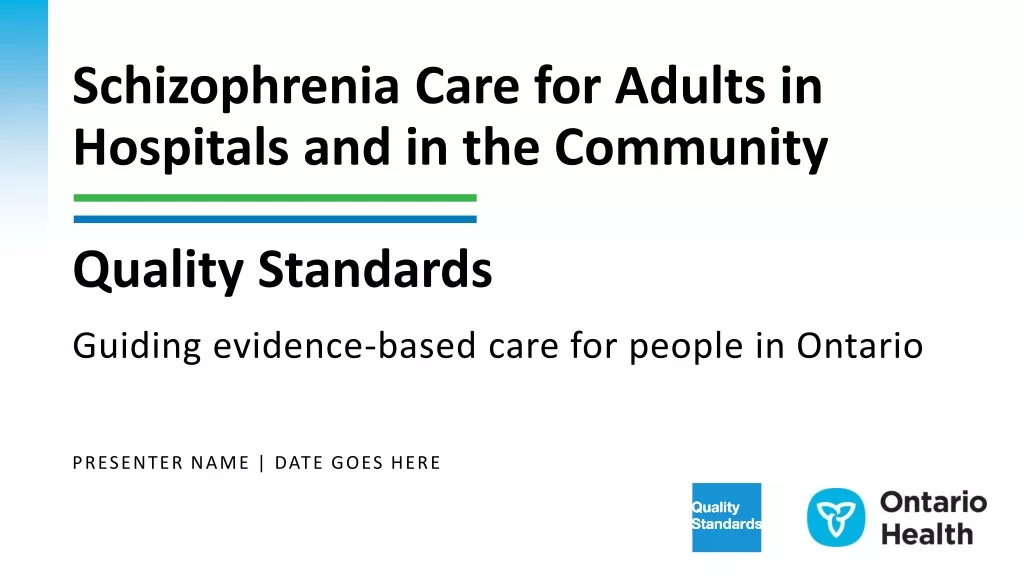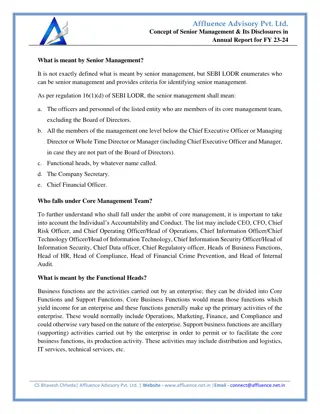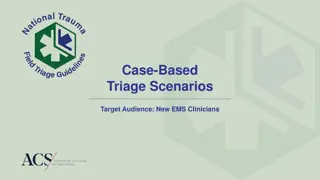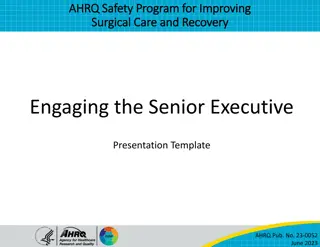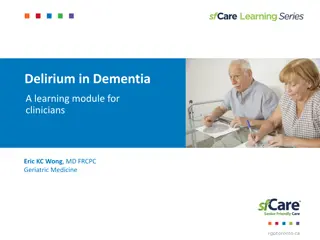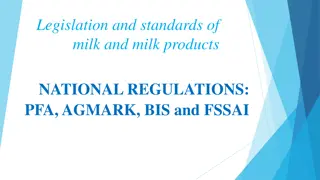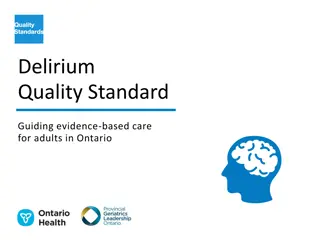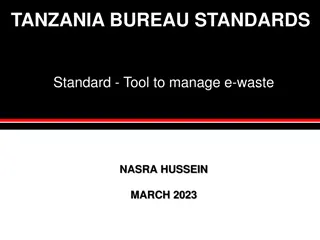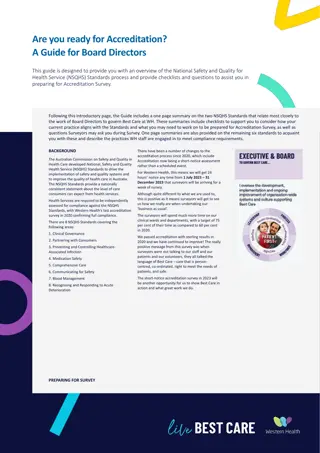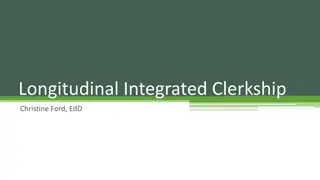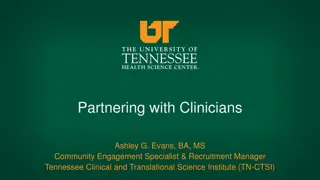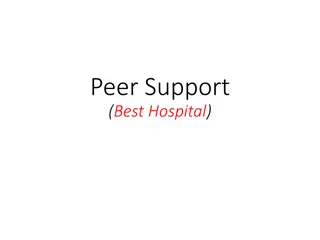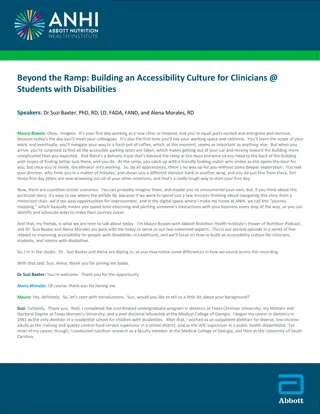Guide: NSQHS Standards for Senior Clinicians
This guide provides an overview of the NSQHS Standards process to help senior clinicians prepare for Accreditation Survey. It includes checklists, questions, and tips on aligning current practices with the Standards. The NSQHS Standards drive safety and quality systems in Australian health care, with a focus on areas like Clinical Governance, Partnering with Consumers, and Medication Safety. The guide emphasizes the importance of promoting Best Care practices every day to be ready for short-notice Accreditation Surveys.
Download Presentation

Please find below an Image/Link to download the presentation.
The content on the website is provided AS IS for your information and personal use only. It may not be sold, licensed, or shared on other websites without obtaining consent from the author.If you encounter any issues during the download, it is possible that the publisher has removed the file from their server.
You are allowed to download the files provided on this website for personal or commercial use, subject to the condition that they are used lawfully. All files are the property of their respective owners.
The content on the website is provided AS IS for your information and personal use only. It may not be sold, licensed, or shared on other websites without obtaining consent from the author.
E N D
Presentation Transcript
Are you ready for Accreditation? A Guide for Senior Clinicians This guide is designed to provide you with an overview of the National Safety and Quality for Health Service (NSQHS) Standards process and provide checklists and questions to assist you in preparing for Accreditation Survey. Following this introductory page, the Guide includes a one page summary on each of the eight NSQHS Standards. These summaries include checklists to support you to consider how your current practice aligns with the Standards and what you may need to work on to be prepared for Accreditation Survey, as well as questions Surveyors may ask you at Survey. TIP! BACKGROUND PREPARING FOR SURVEY The Australian Commission on Safety and Quality in Health Care developed National, Safety and Quality Health Service (NSQHS) Standards to drive the implementation of safety and quality systems and to improve the quality of health care in Australia. The NSQHS Standards provide a nationally consistent statement about the level of care consumers can expect from health services. There have been a number of changes to the accreditation process since 2020, which include Accreditation now being a short-notice assessment rather than a scheduled event. The most impactful way you can prepare for Accreditation Survey is to provide Best Care against the following statements every day. For Western Health, this means we will get 24 hours notice any time from 1 July 2023 31 December 2023 that surveyors will be arriving for a week of survey. Health Services are required to be independently assessed for compliance against the NSQHS Standards, with Western Health s last accreditation survey in 2020 confirming full compliance. Although quite different to what we are used to, this is positive as it means surveyors will get to see us how we really are when undertaking our business as usual . There are 8 NSQHS Standards covering the following areas: The surveyors will spend much more time on our clinical wards and departments, with a target of 75 per cent of their time as compared to 60 per cent in 2020. 1. Clinical Governance 2. Partnering with Consumers We passed accreditation with sterling results in 2020 and we have continued to improve! The really positive message from this survey was when surveyors were out talking to our staff and our patients and our volunteers, they all talked the language of Best Care care that is person- centred, co-ordinated, right to meet the needs of patients, and safe. 3. Preventing and Controlling Healthcare- Associated Infection 4. Medication Safety 5. Comprehensive Care 6. Communicating for Safety 7. Blood Management 8. Recognising and Responding to Acute Deterioration The short-notice accreditation survey in 2023 will be another opportunity for us to show Best Care in action and what great work we do.
Standard 1: Clinical Governance This standard aims to ensure that there are systems in place within Western Health to maintain and improve the reliability, safety and quality of health care The Clinical Governance Standard supports the Pillars of our Best Care Framework the quality systems that support our staff to lead, drive and create Best Care ACCREDITATION CHECKLIST At Survey, you may be asked questions such as: Being prepared for accreditation survey against the Clinical Governance Standard means that How do you promote engagement of clinicians with mandatory training? You promote and model a Positive Workplace Any clinical procedures/guidelines you re responsible for are up-to-date and you promote the use of all relevant PPGs When did you have your last performance development (PDP) review? You are up-to-date with all mandatory & other training relevant to you and promote the engagement of clinicians in training What are the key clinical risks for patients within Western Health? How do you support the review of adverse events, near misses and patients feedback? Your registration and other credentials are current What research and/or quality improvement projects have you undertaken to enhance patient care in the past 12 months? You have a position description that outlines your role and responsibilities You ensure that junior clinicians are supervised (commensurate with level of skill and experience) in and after hours How do you share and discuss clinical performance measures and audit data? You work within your defined scope of clinical practice and your scope of practice is documented on CGOV You have participated in an annual performance discussion in the last 12 months You guide staff to meet requirements for patient care documentation (hard copy or electronic) You know how to activate and respond to an emergency and/or evacuation You know how & feel confident to escalate concerns and report risks to care You lead/contribute to unit/department meetings & org-wide clinical committees You lead Morbidity and Mortality or equivalent meetings and contribute to shared learnings You know how to report a clinical, non-clinical or OHS incident (Riskman) You review & discuss clinical performance/ outcome measures & audit data with your staff You contribute to research & projects/ activities to improve patient care
Standard 2: Partnering with Consumers This standard aims to ensure that consumers are partners in the design, delivery and evaluation of healthcare systems and services, and that consumers, carers and/or their family are supported to be partners in their own care. The Partnering with Consumers Standard supports the Pillars of our Best Care Framework the quality systems that support our staff to lead, drive and create Best Care ACCREDITATION CHECKLIST At Survey, you may be asked questions such as: Being prepared for accreditation survey against the Partnering with Consumers Standard means that In your daily work, how do you partner with patients, their family members and carers? You respect diversity and provide culturally appropriate and sensitive care You introduce yourself to a patient when you are providing care and whenever you interact with them Why is it important to partner with patients and consumers? At which point in a patient s care journey is it most appropriate to identify their cultural and language needs? If you work with children, the information you provide them is age and context appropriate You use interpreters when required How would you respond to a patient who wanted to make a complaint? You are aware of WH strategies in addressing the needs of Aboriginal and Torres Strait Islander people Can you describe a change in the way you provide care that was informed by patient feedback? You provide information to the patient that is easy for them to understand You are aware of the Charter of Healthcare Rights and Responsibilities You involve the patient in their care and you document this in the health record Informed consent is obtained and documented for procedures/surgery You are aware of and utilise Open Disclosure protocols You are aware of your SDC (Statutory Duty of Candour) responsibilities, including involvement in SAPSE activity You know how to respond when patients or visitors provide feedback/make a complaint
Standard 3: Preventing & Controlling Healthcare-Associated Infection This standard aims to reduce the risk of patients getting preventable healthcare-associated infections, manage infections effectively if they occur, and limit the development of antimicrobial resistance through the appropriate prescribing and use of antimicrobials The Preventing and Controlling Healthcare-Associated Infection Standard supports Western Health to provide Safe Care ACCREDITATION CHECKLIST At Survey, you may be asked questions such as: Being prepared for accreditation survey against the Infection Prevention Standard means that Where and how would you access the Infection Prevention Guidelines? You know where to access Infection Prevention Guidelines How do you prevent infections for your patients? You are up-to-date with mandatory hand hygiene training and aseptic technique training How do you know if your patient has an infection or requires precautions? You are up-to-date with mandatory vaccinations When should you use Personal Protective Equipment (PPE) and where is it kept? You follow the infectious diseases screening process required for all patients What is your role in Antimicrobial Stewardship? You know the process for reporting patients with reportable diseases You follow precautions, including 5 moments of hand hygiene Why is good hand hygiene so important? When should you do hand hygiene? You follow the procedures for safe insertion, maintenance & removal of invasive medical devices Can you tell me how you have contributed to infection prevention improvement? You know how to prevent cross contamination of shared equipment and devices You use Personal Protective Equipment (PPE) and know why, where and how to use it You know what to do when your patient becomes infectious You know how to manage accidental exposure to bodily fluids You know about WH s Antimicrobial Stewardship Program and engage in the program as required You know when to review or monitor the antimicrobial usage of your patient You know how to raise a concern or risk about infection prevention You contribute to infection prevention related improvement initiatives
Standard 4: Medication Safety This standard aims to ensure that clinicians safely prescribe, dispense and administer appropriate medicines, and monitor medicine use. It also aims to ensure that consumers are informed about medicines, and understand their own medicine needs and risks. The Medication Safety Standard supports Western Health to provide Safe Care ACCREDITATION CHECKLIST At Survey, you may be asked questions such as: Being prepared for accreditation survey against the Medication Safety Standard means that Where would you find resources to support you with medication management? You know where to access policies, procedures and guidelines relating to Medication Management How do you engage patients with medication management? You are aware of acceptable abbreviations for prescribing What safety checks are required before prescribing a medicine? You know where to find help about medication doses and guidelines How would you report a medication error? You can identify high-risk medications and additional precautions and risk mitigation strategies to use to minimise the risk of errors for these agents What additional safety steps are required for prescribing high risk medicines? You provide information to patients about medications prescribed and check the patient understands it How have you contributed to improvements to the safe use of medications? You know how to obtain and document consent to commence new medications for patients, in particular for off-label use and high-risk medications You know how to manage patients with polypharmacy You are aware of the hospital guideline for VTE prophylaxis You know how to document a VTE risk assessment A list of current medicines including reasons for changes is available to the receiving clinician during clinical handover and on discharge Patient s medication allergies are documented and marked as reviewed on the EMR / patient record You know how to reconcile patient s medication in EMR / patient record on admission and discharge You know how to document patients home medications (ie best possible medication history) You know how to report an adverse drug reaction You know how to report a medication error You know how to raise a concern or risk about medication management in the areas you cover You contribute to medication management related improvement initiatives
Standard 5: Comprehensive Care This standard aims to ensure that consumers receive comprehensive health care that meets their individual needs, and that considers the impact of their health issues on their life and wellbeing. It integrates patient care processes to identify patient needs and prevent harm, and includes actions related to falls, pressure injuries, nutrition, mental health, cognitive impairment and end- of-life care. The Comprehensive Care Standard supports Western Health to provide Person-Centred Care ACCREDITATION CHECKLIST At Survey, you may be asked questions such as: Being prepared for accreditation survey against the Comprehensive Care Standard means that You know where to access the WH Comprehensive Care Policy and related procedures & guidelines How do you engage patients and families in the planning and delivery of care? What processes are used for screening patients at history taking, during clinical examination, and at other appropriate times? You plan care with the patient and their family so they know what to expect at each stage of the care pathway You know when/how often to document your plan of care What processes are in place to ensure that the care delivered at Western Health is consistent with the patient s comprehensive care plan? You know how to support patients to create an advance care plan, how to view an existing plan, and how to deliver comprehensive care to patients at end of life How you know if a patient has an Advanced Care Plan and how would you support them if they want to make one? You know when to complete the Resuscitation Status of a patient You know how to respond to a patient query about voluntary assisted dying How do you respond if a patient asks about access to Voluntary Assisted Dying? You deliver safe care that is based on the patient s comprehensive care plan, and by partnering with patients, carers and families How do you identify and manage a patient at risk of, or with, delirium You discuss pressure injury and fall prevention strategies for high risk patients during ward rounds How have you contributed to the improvement of Comprehensive Care? Re-assessment and change to care plans are communicated and documented in a timely manner You follow WH guidelines for caring with patients with cognitive impairment or at risk of developing, or with, delirium You know what to do if a patient is malnourished or you suspect is at risk of malnutrition You know how to identify and respond to patients at risk of self-harm or suicide You follow WH processes for identifying and managing the occurrence of patient or visitor aggression You understand when, where and how restraint is used within Western Health You know how to raise a concern or risk about comprehensive care in your area You contribute to comprehensive care related improvement initiatives
Standard 6: Communicating for Safety This standard aims to ensure that there is effective communication between patients, carers and families, multi-disciplinary teams and clinicians, and across Western Health, to support continuous, co-ordinated and safe care for patients. The Communicating for Safety Standard supports Western Health to provide Safe Care ACCREDITATION CHECKLIST At Survey, you may be asked questions such as: Being prepared for accreditation survey against the Communicating for Safety Standard means that What are the approved patient identifiers used at Western Health? You know where to access Communicating for Safety related policies, procedures and guidelines (eg clinical handover, patient identification) on the WH Intranet What steps do you take to identify a patient? You keep patients & families informed at all times through their healthcare journey How do you verify the correct person, procedure and site information? You confirm 3 points of patient identification before prescribing, & before any procedure or treatment When should clinical handover occur? Do you know what the ISBAR principle is, what it stands for and when to use it? You follow Time Out procedures where required Handover, utilising ISBAR, is provided for every change of clinician and patient transfer, and concludes with clear transfer of accountability How do you ensure accountability for care is agreed and transferred during handover? You involve the patient during handover / during the ward round whenever possible How are patients and carers involved in handover? You know where to document clinical handover How have you contributed to improved communicating for safety? You know how to communicate critical information You understanding the criteria for reportable deaths You have your own log in on the Births, Deaths & Marriages website to complete a Certificate of Cause of Death Discharge summaries are completed by the time of discharge, or within 48 hours The patient is provided with, and understands, discharge information (verbal and written). The GP is provided with copy of the discharge summary. You know how to raise a concern or risk about communicating for safety in your area You contribute to communicating for safety related improvement initiatives
Standard 7: Blood Management This standard aims to ensure that patients own blood is safely and appropriately managed, and that any blood and blood products that patients receive are safe and appropriate. The Blood Management Standard supports Western Health to provide Safe Care ACCREDITATION CHECKLIST At Survey, you may be asked questions such as: Being prepared for accreditation survey against the Blood Management Standard means that How do you determine if the use of blood and blood products is clinically appropriate for your patient? You know how to optimise a patient s blood count and volume What steps do you take if a patient experiences a reaction to blood or a blood product? You know where to access blood management policies, procedures and guidelines What must be considered before prescribing blood or blood products, to ensure minimal wastage? You are aware of the safe and appropriate use of blood and blood products How do you access best practice and current information around patient blood management? You know where to describe or order blood and blood products, and know the key points in writing an order How have you contributed to improved blood management? You are up-to-date with mandatory blood management training You know how to obtain blood transfusion consent especially for delirious patients You know how to manage patients who refuse blood and blood products You know what to do if your patient has a reaction to blood or a blood product You know how to active the Massive Transfusion Protocol in cases of Emergency You know how to raise a concern or risk about blood management in your area You contribute to blood management related improvement initiatives
Standard 8: Recognising & Responding to Acute Deterioration This standard aims to ensure that acute deterioration in a patient s physical, mental or cognitive condition is recognised promptly and appropriate action is taken. The Recognising & Responding to Acute Deterioration Standard supports Western Health to provide Safe Care ACCREDITATION CHECKLIST At Survey, you may be asked questions such as: Being prepared for accreditation survey against the Acute Deterioration Standard means that How would you respond to a patient who is deteriorating? You know where to access deteriorating patient related Policy, Procedure and Guidelines Do you know how to escalate if your patient has acute mental health deterioration? You have undertaken deteriorating patient related training within the past 12 months (BLS/ALS as a minimum) How would you make a MET call? What is a Call for Help and what is your role when this is actioned? You know how to recognise acute clinical deterioration How have you contributed to improved management of acute deterioration? You know how to respond to patient deterioration You know what Call for Help is and what to do when it is actioned You know your responsibilities when a MET call or Code blue occurs for your patient You know where to complete documentation for medical review, MET call or code blue You know how your unit reviews MET calls and Code Blue calls You know how to raise a concern or risk about recognising & responding to acute deterioration in your area You know your responsibilities in the event of codes or emergencies You contribute to deteriorating patient related improvement initiatives



